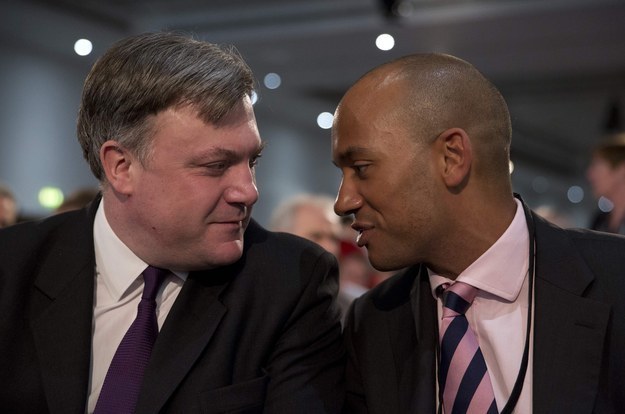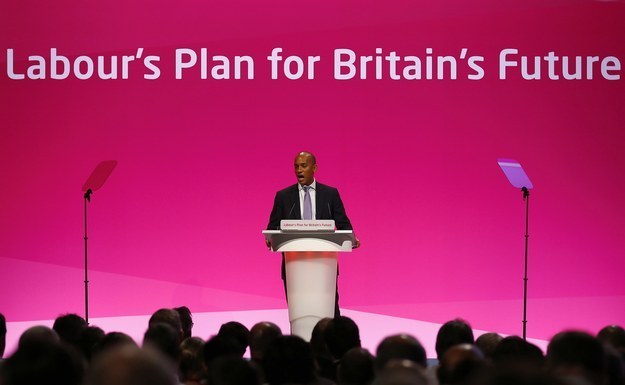
Chuka Umunna, Labour's shadow business secretary, is sitting in his Westminster office discussing his party's tuition fees policy, one of the last big decisions Labour has to make before May's general election. And he pledges students can expect to benefit from some form of "more progressive" system under Labour.
In short, it's going to get cheaper for some people.
"The current system [introduced by the coalition] is unsustainable, and the estimations they made are way off," he says, leaning back in his high-end suit. "Initially they thought they'd have to write off 30% of the student loans [for people who can't afford to pay them back] but it's currently at 45%. There's a big financial issue there and the system's not sustainable, so I'm trying to work out an alternative that is more sustainable and more progressive."
So is this going to be an entirely new system rather than just cutting the maximum £9,000 fee?
"I wouldn't say that, but we're looking at a range of options at the moment. I want a more progressive system but it's a question of what you can do that's credible, achievable. and doesn't cost a lot of money."
It's easy to make such statements, and a proper announcement is due before May's general election. But first there's the matter of Small Business Saturday, Umunna's pet project to promote local businesses by encouraging people to visit their local independent shop on the first Saturday of December.
It's an import from the US, a strictly non-partisan campaign, and – unlike most political policies – was somewhat improbably inspired by the tweets of Jessica Alba and Serena Williams. Yes, really.
"Two years ago I was on a bus going between Streatham and Brixton, checking my Twitter feed, and Jessica Alba and Serena Williams were tweeting about #SmallBizSat," Umunna explains. "When I got back to my flat I googled it, saw what it was all about, and decided we should do this here."
One meeting with some of Barack Obama's economics team ("I've been before, I know some people in the administration") and a visit to a bookstore frequented by the US president on a previous Small Business Saturday later, he had the plan. Two years on, there's an organisation that exists to promote it and hundreds of councillors are signed up to take part. It's a genuine success, an example of a politician doing something positive while out of government.
And that's how Jessica Alba, via Chuka Umunna, helped supply ideas to Chesterfield council.
"In opposition I don't actually have power to do much," Umunna says. "But this one thing is where I can make something positive happen. I'm not that concerned whether we get more votes and I don't need to be in government to make it happen."

On a meet and greet earlier in the day, wandering around Queen's Crescent market in north London, Umunna stands out. He's a smarter dresser that anyone else and is content to chat away to stall owners without being distracted by the people filming him on their iPads. He's confident but has a tough job, and promoting Labour's links with business. Small Business Saturday is one way of mending bridges with the business community while in opposition.
Laurence Heffernan, a market trader for 40 years and a former Conservative voter, isn't overly impressed, despite now leaning towards Labour: "It's too late, they should have done it five years ago. The market traders have either retired or gone to be Ocado drivers.
"He's a nice guy. But what can he do to help me? I want to vote Labour but I can't see [Ed] Miliband getting in."
(Umunna gets a better response from another stallholder, Eve, who bursts into tears as they talk and declares him to have "great warmth" as a person.)
***
Back in his Westminster office, Umunna is attacking UKIP. The son of a "rags-to-riches" Nigerian businessman who married an "upper middle class" English/Irishwoman and enjoyed a "privileged" upbringing, he's willing to shout about the positive benefits of immigration.
"If people want to come here, work hard, and pay their taxes and they have skills we need, then we should welcome them.
"History has shown that after any period of downturn and recession there is a heightened sense of insecurity and instability about the future. There are those with an agenda who have searched around for people to blame other people.
"This is what troubles me about the tenor of the debate that we have – I want a firm and fair immigration policy. All people ask for is a level of control. But do I believe that all of the problems of this country are due to the number of eastern European immigrants here? No. That's a con."

It's only a few weeks since Ed Miliband's position as Labour leader appeared to be under attack. When BuzzFeed News phoned around MPs during the coup that wasn't, one Labour MP said it wasn't just Yvette Cooper and Andy Burnham who were plotting leaderships bids for a post-Miliband world. They said it was Umunna as well, on the quiet.
Umunna won't have it: "Look, I supported Ed's leadership right from the word go, when no one thought he was going to win. I just think everybody's got to be focused on winning and getting him into Number 10."
But your name kept coming up again and again in discussions with MPs.
"I've been very critical of anyone who has indulged in speculation or chat about what if we don't win. I'm not even going to get into that. I have been focused on winning this election and getting Ed in. How do you feel if you're a candidate in a marginal seat and you have message carriers from the national party indulged in...that?
Instead, he wants to focus on community campaigning rather than trying to get people to become members. "The nature of the way that people affiliate with parties is fundamentally changed. You used to sign up, go to a branch meeting. That model is dead. The way we've organised and traditionally done stuff as a party is changing, big time. People want to support parties but not necessarily join them."

After a couple of hours with Umunna, he remains hard to pin down. He's an adept politician, pretty unflappable, but – perhaps because of his corporate-focused beat – it's sometimes hard to work out what really drives him. He sits in the office with Twitter open on his desktop yet insists he tries to ignore the chatter of the Westminster insiders on the social network (Facebook is where the constituents are).
He doesn't buy the papers ("costs a bit of money") but reads the Financial Times on his iPad instead, while also reading non-news sites to "keep it real".
There's not much we know about his personal life, other than that he currently has a flat in Streatham and has his girlfriend round on Friday nights: "We're obsessed with Gogglebox at the moment. She cooks – I'm a terrible cook, apart from roasts." He's got Spotify on his phone, likes to stick Jazz FM on when he comes home, and recommends film-rating app Flixster.
His much-noted DJ skills had a rare airing at a recent friend's wedding ("I did a soulful house set, with a few old-school UK garage tracks. Strictly vinyl"), and he's clearly ambitious, with a strong team of talented advisers around him.
So what's his main motivation? What does he really care about? "The British dream – my dad lived it. The idea that if you work hard, play by the rules, then you'll succeed and can make it."
